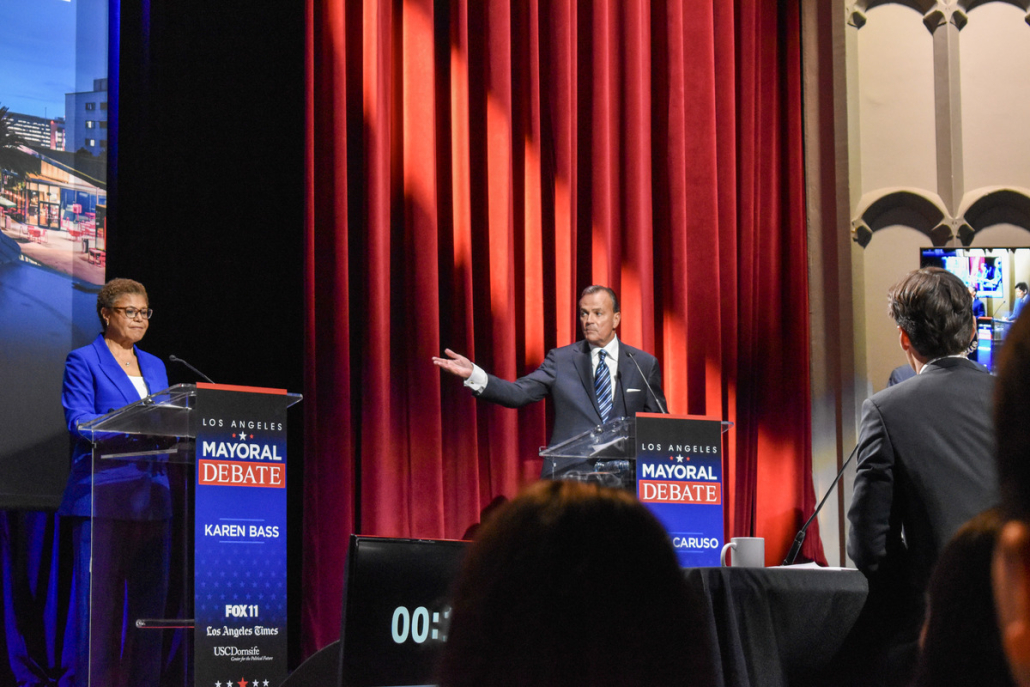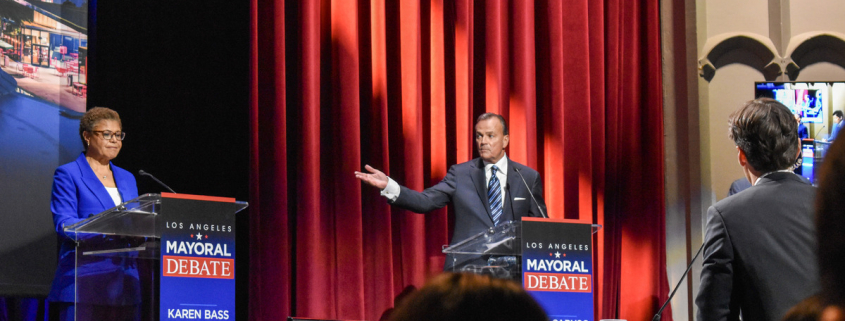U.S. Senators endorse Bass as polling gap narrows

Thirty-one percent of Los Angeles City registered voters are likely to vote for mayoral candidate and former chair of the USC Board of Trustees Rick Caruso in the upcoming Nov. 8 election, who follows behind Rep. Karen Bass by just three percentage points, according to a late September poll by UC Berkeley’s Institute of Governmental Studies.
The closing gap between the candidates’ likelihoods comes amid major recent endorsements for Bass, a 2015 graduate of the Peck School of Social Work. Vermont Sen. and 2020 presidential candidate Bernie Sanders announced his endorsement in an Oct. 4 statement, citing Bass’s plans to “end homelessness, make housing more affordable, create good paying jobs, lower the crime rate and build a diverse coalition.”
Sanders’ endorsement follows California Sen. Dianne Feinstein’s Sept. 28 endorsement of Bass, whose endorsement alongside her counterpart Alex Padilla’s means both California senators back Bass over Caruso. Feinstein described L.A. native Bass as “the type of leader who will work tirelessly to improve the lives of Angelenos” and who will “give 100% to serve the city in which she was born.”
The day before Feinstein’s announcement, the United Firefighters of L.A. City officially endorsed Caruso in a vote of more than 100 union members.
“We congratulate Rick Caruso for presenting a vision for the future of Los Angeles that earned him this endorsement,” their Sept. 27 bulletin stated. “We look forward to working with him in the weeks to come leading up to the November 8 election, and we believe that he can provide the leadership that the City of Los Angeles desperately needs.”
Director for the USC Center for the Political Future Bob Shrum said that Caruso’s campaign argues that “it’s time to try someone who’s not a professional politician.”
Shrum said that though recent polls show “a much closer race among all voters,” there is a 15-point gap in favor of Bass among what the polls define as likely voters, as the L.A. Times reported on Oct. 2. Shrum, however, is careful not to call the election yet.
“If you had to bet money right now … you would probably bet on Bass,” Shrum said. “But I don’t think the race is over by any means. And I think we’ll see an awful lot of television [ads], and I suspect a lot of mailers and a lot of canvassing over the next five or six weeks.”
Shrum added that Caruso, who has spent over $62 million compared to Bass’s $6 million according to the L.A. City Ethics Commission, has “a huge financial advantage.”
“We can anticipate that there will be a pretty substantial number of negative ads coming from the Caruso campaign, and there will be some coming from the Bass campaign,” Shrum said.
Caruso’s critics have cited his failure to donate the one million dollars he pledged May 3 toward the passage of Proposition 1, a proposed amendment to codify abortion rights into the California state constitution.
“His words are, yes, certainly advocating for Democrat policies, but his money and his past actions have shown a different story,” said Sara Stienecker, a sophomore majoring in political science who also serves as the political director for the Trojan Democrats.
The Trojan Democrats endorsed Bass on Mar. 1, which Stienecker said was largely in part because of “the failure that Caruso had to address sexual violence at USC.” The organization also reiterated the significance to them of Caruso’s previous Republican affiliation.
“He hasn’t been a lifelong Democrat, he hasn’t had the values that our organization prioritizes,” Stienecker said. “It’s really important to our organization that we have a true Democrat as L.A. mayor that supports our values and will protect everyone.”

